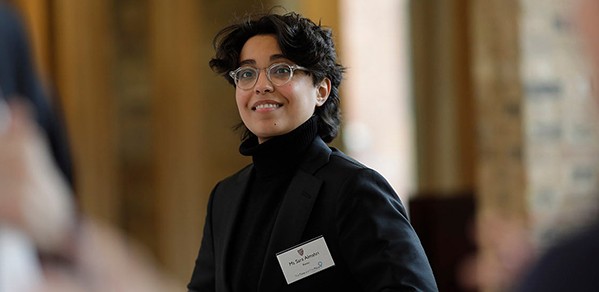
PhD student Sara AlMahri has been announced as the winner of the 2024 Parmee Prize for Entrepreneurship and Enterprise – awarded for her start-up Revco – alongside co-founder Thomas Barber.
With Revco, the tedious, manual generation of BoQs becomes a thing of the past. Our AI tool does it swiftly and precisely. It's the beginning of a connected, efficient construction industry.
PhD student Sara AlMahri
Together, they presented their business idea in front of an audience, including a panel of judges, at Pembroke (hosts of the Parmee Prize). The Prize has been set up by Dr Richard Parmee (1970), who encourages and nurtures students at different stages of their studies into the world of entrepreneurship. The Prize is also supported by fellow Pembroke alumnus Robert Marshall (1981).
Revco is an AI tool designed to tackle time-consuming and labour-intensive work creating Bill of Quantities (BoQ) documents for take-off stages in construction projects.
Sara and Thomas say Revco marks the dawn of “a new era of a connected, efficient construction industry” by bringing automation to an otherwise outdated, manual process.
A BoQ is an essential document that itemises all the materials, work, and costs involved in a construction project. It serves not only as a cornerstone for cost estimation but also as a central communication tool among clients, contractors, and stakeholders. It provides a detailed breakdown, enabling all parties to understand what is required for the job at hand.
“The traditional process of creating a BoQ is an extremely inefficient and time-consuming process involving manual detailed analysis and measurement from construction drawings,” said Sara. “It's a bottleneck that significantly slows down the progress, as it involves hours of labour-intensive work, meticulous accuracy, and can often lead to wasted efforts due to unsuccessful bids. Contractors and subcontractors traditionally invest considerable time in generating BoQs for bids they may not win.”

Revco co-founders Thomas Barber and PhD student Sara AlMahri during their presentation. Credit: Layton Thompson. Copyright Pembroke College Cambridge ©
Revco’s solution is a two-pronged approach:
- Providing automation with deep learning. Harnessing the power of deep learning to take on the heavy lifting of measurement and analysis of construction drawings. Leveraging the standardised nature of construction drawings, Revco uses advanced deep learning models to detect elements, measure spaces and areas, and generate a full and complete BoQ automatically.
- Centralising the value chain. Beyond automation, Revco centralises the entire workflow on a single platform, connecting clients, contractors, and subcontractors. By doing so, it eliminates the silos that typically lead to duplicated efforts and communication breakdowns. A centralised process means that a change or update in the project's scope is reflected across all parties' BoQs in real time, ensuring alignment and transparency throughout the project lifecycle.
Sara added: “Winning the Parmee Prize is a moment of profound pride and excitement for us. The feedback from the judges has been both motivating and affirming. This win has strengthened our commitment to commercialise our technology and drive meaningful change in the construction industry.
“This isn’t just a step up, it’s a leap into a new era for construction. With Revco, the tedious, manual generation of BoQs becomes a thing of the past. Our AI tool does it swiftly and precisely, allowing clients to share project details with contractors right on the platform. Every link in the chain gets stronger: clients gain clear insight into their projects, contractors save valuable time, and the entire network grows as subcontractors and suppliers connect through our hub. Revco is not just a tool; it's the beginning of a connected, efficient construction industry.”

Revco co-founders Thomas Barber and PhD student Sara AlMahri are presented with the 2024 Parmee Prize for Entrepreneurship and Enterprise. Credit: Layton Thompson. Copyright Pembroke College Cambridge ©
About Sara AlMahri
Sara is a second-year PhD student, supervised by Professor Alexandra Brintrup. Sara's PhD research focuses on supply chain traceability through the strategic integration of knowledge graphs (KGs) and Large Language Models (LLMs). Her work tackles the complex challenge of KG construction, which is typically a manual and labour-intensive process, by employing LLMs to automate the extraction and structuring of intricate data. Concurrently, these KGs serve as a robust foundation that prevents the 'hallucinations' often encountered with LLMs, thereby enhancing their reliability. This dual approach boosts the visibility and traceability of supply chain interdependencies, marking a transformative step in the sector.
Sara has been awarded a full scholarship from the Advanced Technology Research Council (ATRC) in Abu Dhabi, UAE, to pursue her postgraduate studies at Cambridge.
Previously, she was a senior researcher at the Advanced Materials Research Centre (AMRC) at the Technology Innovation Institute (TII), in Abu Dhabi, where she was responsible for the design, optimisation and manufacturing of novel lightweight architected structures, capable of withstanding high impact loadings.
About Thomas Barber (co-founder of Revco)
Thomas is currently pursuing a part-time Executive MBA at the Cambridge Judge Business School. He has 15 years’ experience as a quantity surveyor and estimator in the construction industry. He began specialising in the data centre sector 10 years ago.
Thomas's profound industry experience and extensive network have been integral to the start-up of Revco.
Adapted from a Pembroke news article.

